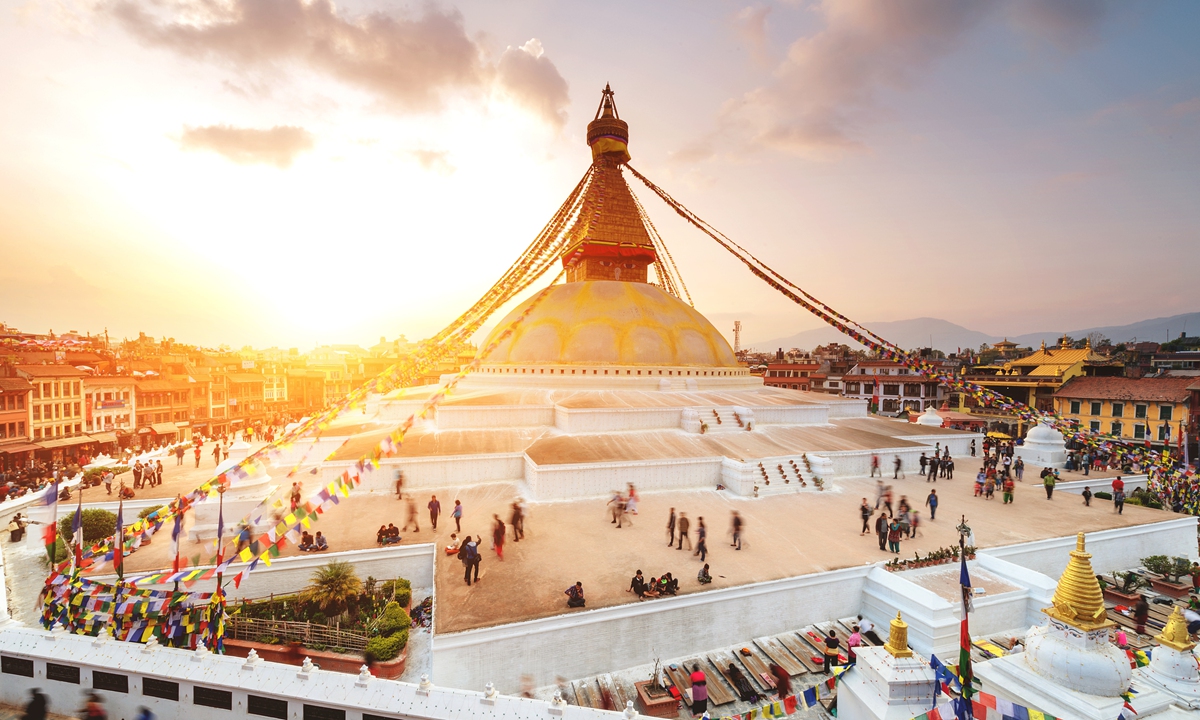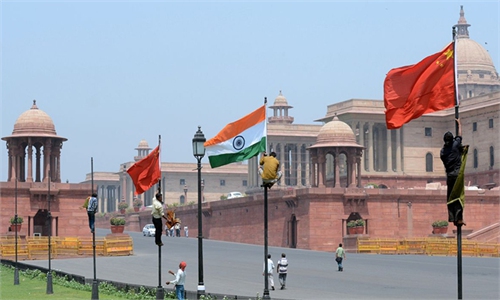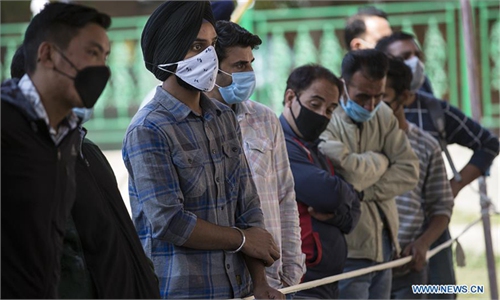Indian army chief’s Nepal visit a PR ploy

Photo: VCG
Indian Army Chief General Manoj Mukund Naravane kicked off a three-day visit to Nepal on Wednesday. Naravane's visit is reportedly the first high-level visit between the two countries since Nepal formally approved in May a revised map of the country, including areas it disputes with India, as a response to India's 2019 new territorial map, which included a disputed area with Nepal. The Press Trust of India (PTI) reported that Naravane's visit is largely aimed at resetting bilateral ties that came under severe strains following a bitter border row.
New Delhi and Kathmandu have maintained close exchanges in terms of politics, diplomacy, defense, military cooperation, culture, and people-to-people relations.
Seeing itself as a "big brother" in South Asia, India is accustomed to bossing regional countries around. In recent years, Nepal has raised awareness to promote its independence and sovereignty. It has also begun to resist India over certain issues. Furthermore, the recent border row has triggered Nepalese nationalist sentiments against India. The Nepalese government also emphasizes the importance of safeguarding sovereignty and security. These factors have led to strained ties between the two countries.
Currently, tensions on the China-India border have not yet eased. India is also facing considerable security pressure due to border disputes with Pakistan. Against this backdrop, New Delhi is aware that it may have to deal with a two-front challenge in the future. India's peripheral situation will be more complicated if its border row with Nepal is not handled smoothly. As a result, New Delhi is proactively mending its ties with Kathmandu in a bid to focus on tensions with both Beijing and Islamabad.
Naravane's visit signals India's willingness to improve bilateral ties with Nepal. The trip might ease the tension between the two countries. This is because the Nepalese military has maintained close ties with the Indian troops. A dialogue between their militaries will play a big role to fix their bilateral relationship.
Additionally, when reporting Naravane's visit, some Indian media outlets have hyped up "China's influence." For example, India Today said that China makes attempts to ramp up its influence in Nepal amid the ongoing military tussle between the People's Liberation Army and Indian Army in the Galwan Valley. The newspaper also noted that China's "land grab" of Nepalese territory and India's border guarding cooperation are likely to be a key agenda for armies of India and Nepal.
PTI said New Delhi's decision to send its army chief to Nepal to reset the ties is regarded as part of its larger exercise to rejuvenate relations with Myanmar, the Maldives, Bangladesh, Sri Lanka, and Bhutan "in the wake of greater efforts by China to expand its influence in the region." India now has border disputes with Pakistan and Nepal. Its relations with other South Asian neighbors seem to be strained as well. India has long behaved in a condescending manner toward these regional countries. This arrogance has triggered their dissatisfaction.
Historically, India tends to provoke these countries first, and then tries to mend ties after triggering strong dissatisfaction among others. Yet New Delhi will act arrogantly with domineering actions again soon after relations are repaired - causing new rounds of boycotts.
On Tuesday, when commenting about the hype over Chinese soldiers allegedly "annexing" land in Nepal, Chinese Foreign Ministry spokesperson Wang Wenbing articulated that it is "a completely unfounded rumor." Nepalese Foreign Ministry spokesperson Sewa Lamsal also claimed, "It is not true."
India has been trying to drive a wedge between China and Nepal by emphasizing the so-called China's growing influence over South Asian countries. This is mainly because India fears China - especially the influence of the China-proposed Belt and Road Initiative (BRI) in South Asia, which New Delhi considers its back yard.
India regards itself as the dominant power in South Asia. It hopes to hold absolute influence over the region and does not wish to see other major powers step into its "turf." Otherwise, New Delhi believes its periphery security, status in the region, and the process to realize its dream to become a major power will be affected.
When China strengthens its ties with South Asian countries, including Nepal, to promote the BRI, India holds the belief that China is weakening India's sphere of influence. It perceives this as an attempt to gang up on India economically and strategically. Therefore, it is viewing the BRI and every relevant move from China with extreme caution.
The author is director of the research department of the National Strategy Institute at Tsinghua University. opinion@globaltimes.com.cn


